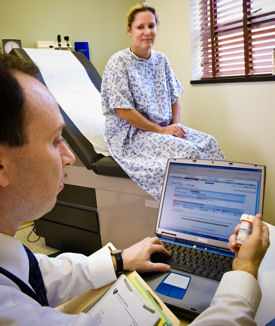ACP program introduces leadership skills to young members
ACP's LEAD program (Leadership Enhancement and Development) grew out of the realization that training physicians in leadership skills would benefit both physicians and the College.
ACP's LEAD program (Leadership Enhancement and Development) grew out of the realization that training physicians in leadership skills would benefit both physicians and the College. Highly competent physicians often lack critical business skills necessary to career success, while ACP needs talented leaders within its membership to help advocate on issues important to the future of internal medicine.
LEAD launched at Internal Medicine 2008, where 86 ACP Members and Fellows gathered to take their first step toward LEAD certification. Members who meet several criteria in three years will earn a certificate recognizing their leadership skills. To learn more about the program's mission and goals, ACP Internist talked to Erik Wallace, FACP, who led the inaugural LEAD precourse at Internal Medicine 2008.
Q: What is the purpose of the College's LEAD program?

A: The College recognizes that young physicians are the future both for the College and for medicine in general. Effective leadership knowledge, skills, and attitudes are essential for physicians to guide our field into the future. The LEAD program's role is not only to provide something of value to Members and Fellows for the benefit of the College, but to provide leadership training so that general internists and subspecialists can be more effective leaders at their home institutions as well as on a local, state and national level.
Q: Is this program primarily for use in a clinical, academic or political setting?
A: Internists who are seeking LEAD certification come from diverse backgrounds. They are private practice physicians, they are in academic settings, and some are in government service. They may or may not be political advocates. The program is designed to give participants a general set of leadership skills that they can use in any setting.
Q: What is the benefit of participating in this program?
A: Physicians in medical school get no formal teaching on leadership skills. However, physicians need to be effective leaders, perhaps more than they might realize when they are in medical school. Even if you consider yourself to be a small-town doctor and you have a solo private practice, there are still other people that you need to work with to be successful—your nursing staff, your front office staff and insurance companies. And you need to be an effective patient advocate, certainly on a local level and perhaps at the state and national levels.
We never work in a silo, although we are trained to work in silos in medical school. To be a successful physician no matter where you are, it is important to have a core set of leadership skills.
Q: What will be offered next year at Internal Medicine 2009?
A: The same course will be offered at the annual meeting, and we're going to add a second leadership course that will focus on more advanced leadership skills.
Also, at each annual meeting, there will be other sessions that qualify as criteria toward the LEAD certificate. This year, for example, there were eight sessions, including Negotiation Skills for Women Physicians, How to Be an Effective Leader, Negotiating Residency and Employment Issues for IMGs, and Leading and Managing Change, that qualified for LEAD credit.
More information about the LEAD program is online.




